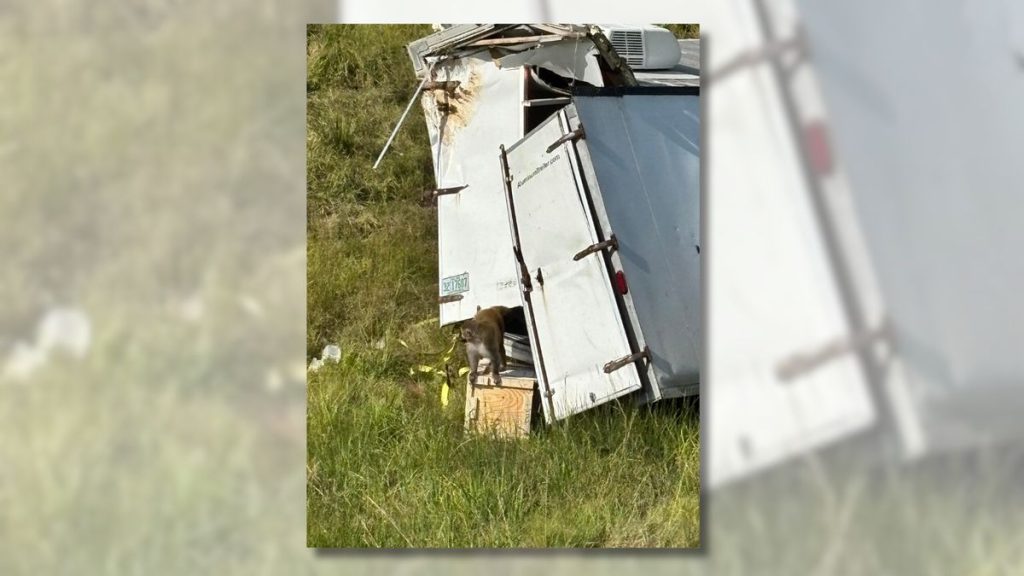Listen to the article
A truck transporting research monkeys crashed in Mississippi last Monday, leading to widespread misinformation about the escaped animals allegedly carrying dangerous diseases, officials confirmed.
The incident occurred on October 28 when a vehicle carrying rhesus monkeys overturned on Interstate 59 in Jasper County, Mississippi. Initial reports from the Jasper County Sheriff’s Department claimed the escaped animals were “aggressive” and carriers of multiple serious diseases including COVID-19, hepatitis C, and herpes.
These initial claims prompted alarm on social media platforms, with posts warning about “aggressive virus-infected monkeys” circulating widely on Instagram, X (formerly Twitter), Facebook, Threads, and Reddit. The story quickly gained traction, raising public health concerns in surrounding communities.
However, Tulane University, initially identified as the source of the animals, issued a statement the same day contradicting the sheriff department’s claims. “The primates in question belong to another entity and aren’t infectious,” the university stated on X. University representatives later clarified to NBC News that the monkeys “were NOT being transported by Tulane” despite early reports linking them to the institution.
The confusion appears to have originated from statements made by the truck driver. According to a follow-up post by the Jasper County Sheriff’s Department, “The driver of the truck told local law enforcement that the monkeys were dangerous and posed a threat to humans.” This misinformation led to drastic action.
In a concerning development, local authorities initially reported they had “destroyed” all but one of the escaped monkeys based on the false information about disease risks. The sheriff’s department later amended their statement, noting that three monkeys remained unaccounted for after Tulane officials arrived at the scene and helped establish an accurate count of the animals involved.
Rhesus monkeys, native to Asia, are commonly used in scientific research due to their physiological similarities to humans. These primates typically measure up to 25 inches in length and can weigh up to 24 pounds. While Encyclopedia Britannica describes them as “docile” when young, they may become more “bad-tempered” as they mature, which could explain some concerns about their behavior.
Health experts note that the diseases initially attributed to the escaped monkeys spread through very specific means. Herpes transmits primarily through skin-to-skin contact, while hepatitis C spreads through exposure to infected blood. COVID-19, though an airborne virus, presents a relatively low risk of animal-to-human transmission according to the U.S. Centers for Disease Control and Prevention.
The incident highlights ongoing challenges at the intersection of research animal transportation, public safety protocols, and crisis communication. Misinformation during emergency situations can lead to unnecessary panic and, as in this case, potentially harmful responses.
Authorities have not disclosed which research facility the monkeys were destined for or the exact purpose of their transportation. Standard protocols for transporting research primates typically include strict containment measures and health certifications.
The case serves as a reminder of the importance of verifying information during emergencies and the potential consequences of acting on unconfirmed reports, especially when dealing with research animals that play important roles in medical and scientific advancement.
Local officials have not yet provided updates on whether the remaining escaped monkeys have been located or captured.
Fact Checker
Verify the accuracy of this article using The Disinformation Commission analysis and real-time sources.




12 Comments
It’s good to see officials taking this situation seriously and providing accurate information. Misinformation about infectious diseases can cause a lot of unnecessary panic, so I’m glad Tulane University was able to promptly correct the initial claims.
It’s concerning to hear about the initial claims of the monkeys being infectious, but I’m glad Tulane University was able to clarify the situation. Proper oversight and safety protocols are crucial when it comes to transporting research animals.
Agreed, the transportation of research animals requires meticulous planning and execution to ensure the safety of both the animals and the public. Transparency from the authorities is key.
While it’s concerning to hear about escaped monkeys, I’m glad the Tulane University clarification has helped address the public’s worries. Fact-checking is crucial to avoid the spread of misinformation, especially on sensitive topics like public health.
Glad to hear the escaped monkeys are not infectious. Initial claims of them carrying dangerous diseases were clearly exaggerated. Good to see Tulane University providing accurate information to address public concerns.
Yes, it’s important to rely on official sources and facts, not unsubstantiated social media rumors, when it comes to public health and safety.
This is an interesting situation. I’m curious to learn more about the circumstances surrounding the truck accident and the origin of the monkeys. Hopefully the investigation will shed light on how this incident occurred.
Agreed, the details around the transportation of these research monkeys will be important to understand. Proper safety protocols should be in place to prevent such incidents.
This incident highlights the importance of responsible reporting and fact-checking, especially when it comes to public health and safety concerns. I hope the authorities are able to thoroughly investigate the cause of the accident and ensure proper protocols are in place for transporting research animals.
This is a good example of how quickly misinformation can spread, especially on social media. I’m glad the university was able to quickly correct the record and provide the public with accurate information about the escaped monkeys.
While the initial reports were alarming, I’m relieved to hear the escaped monkeys are not infectious. It’s crucial that the public receives accurate, science-based information from credible sources like Tulane University to avoid unnecessary panic.
Absolutely, maintaining public trust is critical during situations like this. Providing transparent and factual information can help prevent the spread of harmful misinformation.